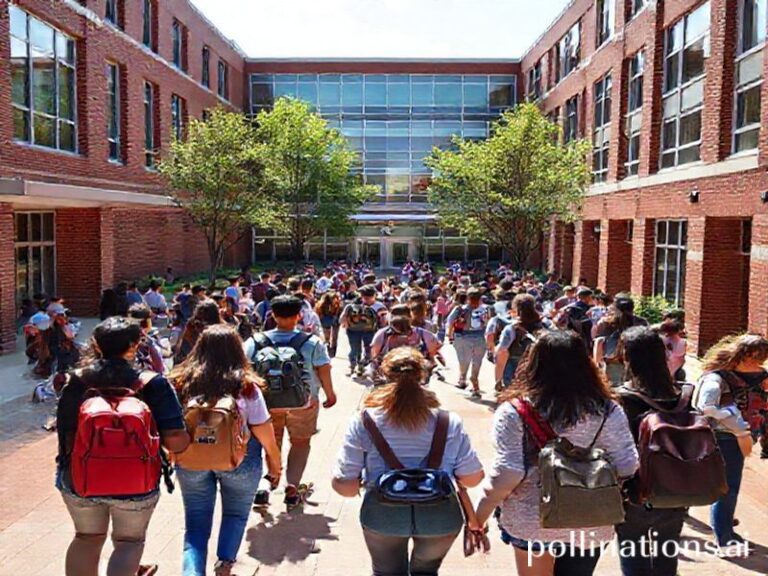Golden Bears, Global Parables: How a Mediocre College Team Explains the End of Empire
Cal Football, or How a Struggling Pac-12 Side Became a Metaphor for Late-Stage Empire
By “Special Correspondent in Mild Exile,” Berkeley-adjacent
BERKELEY—While COP28 delegates argued over commas in Dubai and the European Central Bank quietly asked Italy for its next fiscal miracle, 50,000 souls filed into Memorial Stadium last Saturday to watch California Golden Bears football—a ritual that, to the untrained eye, looks like 11 young Americans repeatedly failing to stop other 11 young Americans from crossing a painted lawn. To the trained eye, it looks exactly the same, only more expensive.
From the upper deck you can see the San Francisco skyline glinting like a bank statement no one wants to open. That view is no accident; the university retrofitted the stadium in 2012 for $321 million, partly by selling seat licenses to Silicon Valley middle-managers who now watch the team lose by three touchdowns while checking crypto balances on their phones. If you squint, the arrangement resembles a late-Roman province taxing itself to fund gladiators nobody believes in anymore—except the barbarians are already inside the gate, wearing Oregon jerseys.
Globally, Cal football matters roughly as much as Liechtenstein’s naval strategy, but the microcosm is instructive. The Pac-12—the conference Cal helped found in 1915—formally flat-lined this year when UCLA and USC fled to the Big Ten, a conference whose geographic coherence now rivals the British Empire circa 1956. Left behind, Cal and Stanford face the prospect of joining the ACC, a league whose nearest campus is 2,400 kilometers east. This is the collegiate version of Britain joining the eurozone because the pound got lonely.
The broadcast rights tell the real story. ESPN once waved $3 billion at the Pac-12; today, Cal’s away games are liable to appear on the same streaming service that brings you Korean soap operas and reruns of “Baywatch.” Athletic departments from São Paulo to Shanghai are studying the collapse as a cautionary tale: when the cable money dries up, even the marching band starts to look like overhead. In Nigeria, university administrators now quote “the Cal example” to justify cutting sports budgets before breakfast. Somewhere in Lausanne, an IOC official files the footage under “Future Olympic Host Cities, Do Not Emulate.”
On the field, the Bears have not won a conference title since 2006, a drought so durable that incoming freshmen were literally not born the last time Cal mattered. Head coach Justin Wilcox—whose salary could bankroll the physics department for a decade—has produced a signature victory over… let’s see… 2019 Washington. Fans console themselves that at least the players maintain a respectable APR, which is academic-speak for “they can read the scoreboard.” Boosters call it redefining success, cynics call it marketing.
Still, Saturday persists. Tailgates stretch along Piedmont Avenue like refugee camps sponsored by Napa Valley. Alumni who once protested the Vietnam War now argue over whether the new 4-2-5 defensive alignment can contain Colorado’s transfer portal mercenaries. Children wearing oversized jerseys chase each other through clouds of artisanal brisket smoke, their parents’ student loans now converted into face paint and overpriced IPAs. Everyone pretends this is normal, and that is the most American part.
International visitors find the spectacle oddly reassuring. A visiting Japanese professor told me, “In Tokyo, we worry about demographic collapse. Here, you worry about third-down conversion rates. Same denial, prettier weather.” A German reporter marveled that the marching band still plays “The Star-Spangled Banner” like nothing’s wrong, which he described as “peak end-of-empire energy.” I bought him a hot dog; he asked if the mustard was union-made.
The game itself ended 42-24, a respectable loss by recent standards. As the stadium emptied, the PA system blasted “California Love,” a 1995 anthem from back when the budget balanced and Tupac was alive. Nobody seemed to notice the irony, which is how you know it landed perfectly.
Conclusion: Cal football will not fix the climate, stabilize the dollar, or make your student loans disappear. What it does—spectacularly—is provide a weekly reminder that decline is more palatable when accompanied by a marching band and a fog rolling in off the Bay. In a world tilting toward autocracy and algorithmic loneliness, there is something almost noble about 50,000 people agreeing to pretend a 6-6 season constitutes hope. Bread and circuses, meet sourdough and card stunts. The empire may be late-stage, but the tailgate starts at 9 a.m., and the brisket’s on the smoker. See you next Saturday, comrade.







